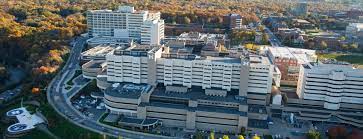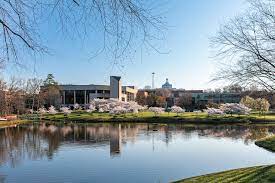The Comprehensive Guide to the Georgetown University School of Medicine
Introduction
Welcome to the comprehensive guide to the Georgetown University School of Medicine! Whether you're considering pursuing a medical degree, already a student, or simply interested in learning more about this prestigious institution, this guide aims to provide you with all the essential information about the Georgetown University School of Medicine. From its rich history and academic programs to campus facilities and student life, we will explore the various aspects that make this medical school a unique and exceptional place of learning.
History of the Georgetown University School of Medicine
The Georgetown University School of Medicine, founded in 1851, has a rich history rooted in its commitment to excellence in medical education, research, and patient care. Located in Washington, D.C., the school has a longstanding tradition of producing exceptional physicians and contributing to advancements in healthcare. Throughout its history, the Georgetown University School of Medicine has remained dedicated to its mission of training compassionate and socially conscious healthcare professionals.
Academic Programs
The Georgetown University School of Medicine offers a wide range of academic programs designed to prepare students for successful careers in medicine. The curriculum emphasizes a strong foundation in medical science, clinical skills development, and compassionate patient care. Key academic programs at the school include:
-
Doctor of Medicine (MD): The MD program at the Georgetown University School of Medicine is a comprehensive four-year program that combines classroom-based learning, clinical experiences, and research opportunities. The curriculum emphasizes the integration of basic sciences and clinical medicine, providing students with a well-rounded medical education.
-
Dual Degree Programs: The school offers several dual degree programs, allowing students to pursue additional degrees alongside their medical education. These programs include MD/PhD, MD/MS in Global Health, and MD/MS in Biohazardous Threat Agents & Emerging Infectious Diseases, among others. Dual degree programs provide students with opportunities to explore their specific interests and integrate their medical training with other disciplines.
-
Master's Programs: The school offers various master's degree programs for individuals interested in furthering their education in specific areas of healthcare. These programs include Master of Science in Biomedical Science Policy & Advocacy, Master of Science in Health Systems Administration, and Master of Science in Physiology & Biophysics, among others.
Campus Facilities
The Georgetown University School of Medicine is located on the Georgetown University Medical Center campus, which provides a vibrant and collaborative environment for medical education and research. The campus features state-of-the-art facilities that support learning, innovation, and patient care. Some notable campus facilities at the school include:
-
Medical-Dental Building: The Medical-Dental Building houses classrooms, lecture halls, research laboratories, simulation centers, and administrative offices. It provides a modern and conducive learning environment for students and faculty.
-
MedStar Georgetown University Hospital: The school is closely affiliated with MedStar Georgetown University Hospital, a renowned academic medical center. The hospital serves as a primary training site for students, offering a diverse range of clinical experiences across various medical specialties.
-
Research Laboratories: The school is home to research laboratories where faculty and students conduct cutting-edge biomedical research. These laboratories are equipped with advanced technologies and equipment to facilitate scientific discoveries and medical advancements.
Research Opportunities
The Georgetown University School of Medicine is committed to advancing medical knowledge through research. The school offers numerous research opportunities for students to engage in scientific inquiry and contribute to the field of medicine. Students can work with faculty mentors on ongoing research projects or pursue their own research interests through independent study or fellowships. The school's research efforts encompass a wide range of disciplines, including basic science, translational research, and clinical investigation.
Clinical Education
Clinical education is a cornerstone of the curriculum at the Georgetown University School of Medicine. Students gain valuable hands-on experience through clinical rotations at affiliated hospitals, clinics, and healthcare institutions. The school's strong clinical affiliations provide students with exposure to diverse patient populations and a wide range of medical conditions. Clinical education focuses on developing clinical skills, professionalism, and a patient-centered approach to care.
Student Life
The Georgetown University School of Medicine offers a vibrant and supportive student community. The school recognizes the importance of a well-rounded educational experience and provides opportunities for students to engage in extracurricular activities, student organizations, and community service initiatives. Some aspects of student life at the school include:
-
Student Organizations: Students can join various student organizations and interest groups related to their medical specialties, research interests, and community outreach. These organizations provide opportunities for networking, mentorship, and professional development.
-
Community Service: The school encourages students to actively engage in community service activities and initiatives. Students have the opportunity to volunteer at local clinics, participate in medical outreach programs, and contribute to initiatives aimed at improving healthcare access and outcomes for underserved populations.
-
Campus Events: The school organizes academic conferences, seminars, and speaker series that bring together students, faculty, and experts in various medical fields. These events provide valuable learning opportunities, foster intellectual exchange, and expose students to cutting-edge medical advancements.
Notable Alumni
The Georgetown University School of Medicine boasts a distinguished alumni community of physicians, researchers, educators, and leaders in the healthcare field. Notable alumni of the school include:
-
Dr. Anthony Fauci - Director of the National Institute of Allergy and Infectious Diseases (NIAID) and prominent figure in public health.
-
Dr. Joycelyn Elders - Former Surgeon General of the United States and advocate for public health and healthcare reform.
-
Dr. Victoria Fraser - Infectious disease specialist and leader in healthcare-associated infection prevention.
FAQs
-
Q: How can I apply to the Georgetown University School of Medicine? A: Prospective students must complete the American Medical College Application Service (AMCAS) application and submit additional materials through the Georgetown-specific application portal. The admissions process evaluates academic achievements, MCAT scores, letters of recommendation, personal statements, and interviews.
-
Q: What are the prerequisites for applying to the school? A: The school requires completion of specific premedical coursework, including biology, chemistry, physics, mathematics, and English. Applicants should refer to the official admissions website for detailed prerequisite information.
-
Q: Does the school offer financial aid? A: Yes, the Georgetown University School of Medicine offers financial aid options, including scholarships, grants, loans, and work-study programs. Students are encouraged to explore the financial aid resources and opportunities available to them.
-
Q: Are there opportunities for research at the school? A: Yes, the school provides various research opportunities for students to engage in scientific inquiry. Students can collaborate with faculty mentors on research projects or pursue independent research initiatives in their areas of interest.
Conclusion
In conclusion, the Georgetown University School of Medicine stands as a renowned institution that provides outstanding medical education, fosters groundbreaking research, and prepares future physicians to make a difference in healthcare. With its rich history, comprehensive academic programs, state-of-the-art facilities, and vibrant student community, the school offers a supportive and stimulating environment for aspiring medical professionals.

 By
By


